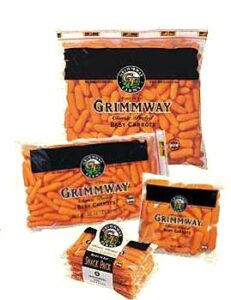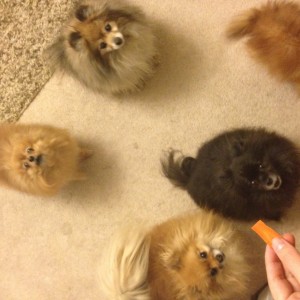The other day I wrote a post with a picture of a Pommy Mommy’s Pom who loves eating “baby carrots,” and it wound up creating a little controversy on the Fan Page. So, I decided to dive in and find out the truth for myself because my Pomeranians, especially “Little Sophia,” love baby carrots, and I would never want her to be hurt by something that’s supposed to be healthy.
Seeking Expert Advice
 Not many people know this, but my husband was—and still is—one of the top fitness professionals in the industry. He has since found more passion in building businesses like “Pommy Mommy” and other internet ventures. There aren’t many things my husband doesn’t know about nutrition, so I went up to his office to get the truth.
Not many people know this, but my husband was—and still is—one of the top fitness professionals in the industry. He has since found more passion in building businesses like “Pommy Mommy” and other internet ventures. There aren’t many things my husband doesn’t know about nutrition, so I went up to his office to get the truth.
After he started laughing, he told me in his thick New York accent that the “stupidity” about baby carrots making its way around the internet is just that—stupidity. In the 1980s, baby carrots were actually “baby” carrots, immature and pulled out before they were fully grown. That seemed wasteful to carrot farmers, so a guy named Mike Yurosek decided to cut down the mangled or split carrots, peel them, and call them “baby” carrots. They were actually called “bunny balls” at first, but that didn’t go over well. However, “baby” carrots became a hit, the perfect snack for people who wanted something healthy to keep their blood sugar up throughout the day.
The Misinformation Begins
This is where everything started to get twisted. Someone thought it would be a great idea to send a post around Facebook telling everyone that baby carrots were dangerous and that people shouldn’t eat them because they could cause cancer. My husband just started shaking his head in disbelief. Almost everything the post said was either an outright lie or an exaggeration of the truth. If baby carrots were harmful to people, they would also harm Pomeranians—but that’s not true.
The Truth About Baby Carrots and Chlorine
 The biggest lie is that Grimmway, the maker of the Cal-Organic brand, doused its baby carrots with chlorine (a carcinogen) in large amounts. But they don’t. A simple call to Grimmway told the real story. Baby carrots are cut from big carrots into 2-inch pieces, peeled in an industrial peeler (similar, and then bagged. During the washing process, to a big potato peeler), washed the big lie and controversy started.
The biggest lie is that Grimmway, the maker of the Cal-Organic brand, doused its baby carrots with chlorine (a carcinogen) in large amounts. But they don’t. A simple call to Grimmway told the real story. Baby carrots are cut from big carrots into 2-inch pieces, peeled in an industrial peeler (similar, and then bagged. During the washing process, to a big potato peeler), washed the big lie and controversy started.
Grimmway admitted using a “chlorine wash” to clean the baby carrots, but fanatical people blew the words “chlorine wash” out of proportion. Scientists sometimes use terminology that laypeople misunderstand, and that’s what happened here.
Many carrots are washed with chlorinated water, which must have a healthy range of pH between 6.0 and 7.0. The chlorine concentration in the water is between 100 and 150 ppm (parts per million), and the carrots’ exposure to this water doesn’t exceed 5 minutes. Afterward, the chlorine is removed by rinsing with potable water or using a centrifugal drier. The use of chlorine as an antimicrobial treatment is an accepted practice for all fresh-cut, ready-to-eat vegetables, according to the American and Canadian Food Inspection Agencies.
The Role of Chlorine in Food Safety
 The chlorine used is most likely sodium hypochlorite, an anti-viral, anti-bacterial, and anti-fungal (the main ingredient in our OxyX PH Booster). It is used as a natural disinfectant and antimicrobial in many industries. Sodium hypochlorite is made by reacting a sodium hydroxide solution (an unstable salt) with elemental chlorine gas. These chemicals are made from sodium chloride, commonly known as salt. If you research “cholera,” you’ll see how people used to get sick from bacterial infections before disinfecting with chlorine—so chlorine used correctly is a good thing.
The chlorine used is most likely sodium hypochlorite, an anti-viral, anti-bacterial, and anti-fungal (the main ingredient in our OxyX PH Booster). It is used as a natural disinfectant and antimicrobial in many industries. Sodium hypochlorite is made by reacting a sodium hydroxide solution (an unstable salt) with elemental chlorine gas. These chemicals are made from sodium chloride, commonly known as salt. If you research “cholera,” you’ll see how people used to get sick from bacterial infections before disinfecting with chlorine—so chlorine used correctly is a good thing.
Like other ready-to-eat fresh vegetables, baby-cut carrots are rinsed or sprayed with a very diluted chlorine wash to reduce the risk of bacterial contamination, then thoroughly washed and bagged. The FDA has approved this process, and the Canadian Food Inspection Agency has accepted it. Chlorine is also used to disinfect public water supplies and in poultry processing. While it is toxic at high concentrations, trace amounts left on food and in water present no evidence of harm to you or your Pomeranian.
Debunking the White Blush Myth
Another big lie is the white coating, or “white blush,” appearing on baby carrots is chlorine coming out of the carrot. Again, this is not true. Baby carrots, like onions, potatoes, lettuce, and other vegetables, are living growing things. Baby carrots are peeled by abrading the outer skin, and because there’s usually no moisture in the bags when sent to market, the carrots start to dry out. It’s similar to when your skin dries out without moisturizer—it gets a white, chalky look. The same thing happens to baby carrots.
The Bottom Line: Baby Carrots Are Safe
So, fuggettabout it, (hee, hee, I tried to do that in my husband’s voice, did it come through?) Pommy Mommies, if you feed your Pomeranians baby carrots as a treat, keep feeding them. There is no harm to you or your furry baby.
Related Posts:
Vegetables Pomeranians Can Eat
Pomeranian Bonding and Life Lessons: A Heart-Warming Day
